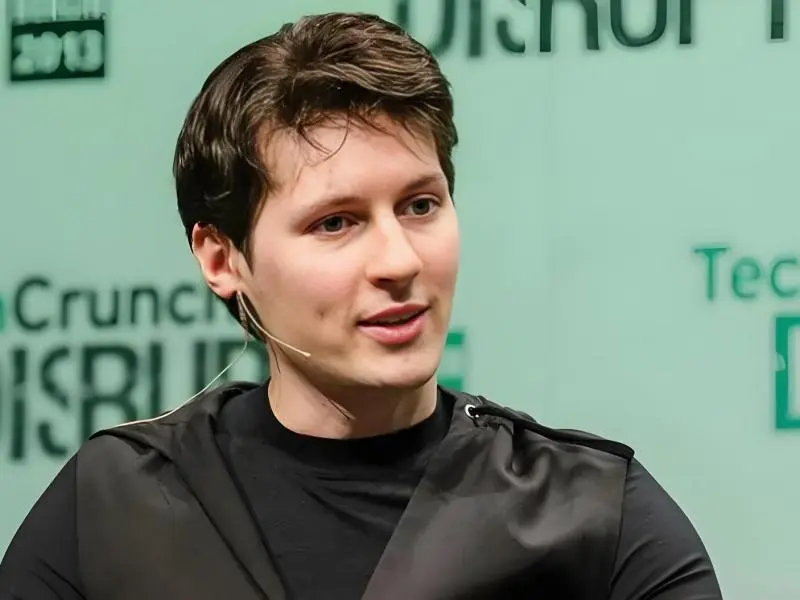- Pavel Durov, the founder and CEO of the encrypted messaging app Telegram, was arrested at Paris’s Bourget Airport of August 24, 2024.
- Pavel Durov’s influence and Telegram’s role in shaping the future of communication and privacy remain significant.
OUR TAKE
Pavel Durov’s growth from a Russian programmer to the visionary behind Telegram demonstrates his unwavering commitment to the ideals of privacy, security, and freedom of expression in the modern digital environment. His steadfast advocacy of these values has earned him a loyal user base that cherishes the sanctity of private communication without the threat of interference or surveillance. However, Durov’s recent arrest has shocked the tech community and sparked widespread concern about the future of digital privacy and free speech safeguards.
–Rebecca Xu, BTW reporter
The early years: From education to entrepreneurship
Pavel Durov, the prominent Russian entrepreneur and programmer, was born on October 10, 1984, in Leningrad, part of the former Soviet Union. Raised in a family of academicians, Durov’s upbringing was steeped in a culture of intellectual curiosity and innovation, laying the foundation for his future endeavours in the tech world. His father, a respected professor at the prestigious Saint Petersburg State University, instilled in him a deep appreciation for mathematics and spurred his interest in computer science from a young age.
My passion for programming and technology was ingrained in me from a young age, thanks to my family’s influence and my own curiosity about how things work.
Pavel Durov
Drawing from his familial background and the academic environment in which he was raised, Durov pursued studies in philology and computer science at Saint Petersburg State University. “My passion for programming and technology was ingrained in me from a young age, thanks to my family’s influence and my own curiosity about how things work.” said Pavel Durov. It was during his time at the university that Durov honed his programming skills and embarked on the path that would lead to his meteoric rise in the tech industry. Fuelled by a passion for technology and a drive for innovation, Durov leveraged his academic training to delve into the world of social networking platforms, laying the groundwork for his groundbreaking projects to come.
As his proficiency in programming grew, Durov ventured into the realm of social media with the launch of VKontakte, a platform often dubbed as the Russian equivalent of Facebook. Founded while he was still a student, VKontakte quickly gained traction and rose to prominence in the Russian-speaking world, attracting millions of users and solidifying Durov’s reputation as a visionary tech entrepreneur. This initial success set the stage for Durov’s future endeavours, propelling him into the spotlight and establishing him as a leading figure in the digital landscape.

Also read: Pavel Durov’s Telegram case awaits French judge’s next move
The rise and fall of VKontakte
In 2006, Durov co-founded VKontakte, a social networking platform that quickly gained popularity in Russia and other Russian-speaking countries. VKontakte grew to become the most visited website in Russia and was dubbed the “Facebook of Russia,” with over 100 million registered users. However, Durov’s tenure at VKontakte was marked by controversies and conflicts with the Russian government over censorship and privacy issues. In 2014, Durov was forced to sell his stake in VKontakte and leave the company amidst pressure from the authorities.

Also read: Telegram CEO Pavel Durov arrested in France
The birth of Telegram: A new era in messaging
Following his departure from VKontakte, Pavel Durov set his sights on launching his next revolutionary project, Telegram, a secure messaging app that places a premium on user privacy and data protection. Introduced to the public in 2013, Telegram swiftly captured the attention of users seeking heightened levels of encryption and anonymity in their digital communications. The platform’s staunch commitment to security and privacy quickly endeared it to a diverse user base, particularly activists, journalists, and individuals living in regions marked by strict censorship laws.
Telegram was created with the belief that everyone has the right to communicate freely and securely, without fear of surveillance or interference from third parties.
Pavel Durov
Recognising the growing demand for secure communication platforms in an era of increasing digital surveillance, Durov’s Telegram emerged as a beacon of digital freedom, offering users a sanctuary for unimpeded and confidential exchanges. Pavel Durov said: “Telegram was created with the belief that everyone has the right to communicate freely and securely, without fear of surveillance or interference from third parties.”

Guided by Durov’s visionary leadership, Telegram has experienced remarkable growth and continuous innovation, solidifying its status as a frontrunner in the messaging app arena. Through a relentless dedication to enhancing user experience, Telegram has expanded its repertoire of features to include encrypted voice calls, video calls, and seamless file sharing functionalities, catering to the evolving needs of its vast user base. Boasting over 500 million monthly active users, Telegram has emerged as one of the most sought-after messaging platforms globally, a testament to the app’s inherent appeal and unwavering commitment to safeguarding user data.
Furthermore, Telegram’s integration of support for digital currencies and blockchain technology has positioned it as a go-to platform for cryptocurrency enthusiasts and traders, demonstrating Durov’s ability to anticipate market trends and cater to the diverse needs of tech-savvy consumers.
Pop quiz
Why did Durov sell his shares in VKontakte and leave the company?
A. He wanted to start a new company.
B. The stress of running the company overwhelmed him.
C. He was forced to make a choice under pressure from the authorities.
D. The company is on the verge of bankruptcy.
The answer is at the bottom of this article.
The struggle for freedom and independence
Pavel Durov was arrested by French police at Le Bourget Airport north of Parisof on August 24, 2024. The 39-year-old billionaire was detained upon his private jet’s arrival at the airport, with officials citing a warrant related to offences connected to the popular messaging app. The investigation centres around allegations of a lack of moderation on Telegram, with accusations that Durov failed to take steps to address criminal uses of the platform.
Specifically, the probe alleges that Telegram has not cooperated with law enforcement efforts aimed at combating drug trafficking, child sexual content, and fraud. Authorities claim that the app’s failure to enforce content moderation measures has enabled these illicit activities to persist on its platform. Despite these allegations, Telegram has staunchly denied claims of inadequate moderation practices, emphasising its commitment to ensuring the security and integrity of its users.
The arrest of Telegram CEO Pavel Durov is a shock and deeply saddening, representing a violation of fundamental human rights like freedom of speech and association.
Edward Snowden, the whistleblower known for exposing mass surveillance programs
Edward Snowden, the whistleblower known for exposing mass surveillance programs, expressed his sentiments, saying, “The arrest of Telegram CEO Pavel Durov is a shock and deeply saddening, representing a violation of fundamental human rights like freedom of speech and association. It’s a disgrace not just to France but to the entire world.”
Durov’s arrest marks a significant escalation in the ongoing scrutiny faced by tech companies over their handling of user-generated content and cooperation with law enforcement agencies. The incident underscores the challenges that platforms like Telegram encounter in balancing the imperative of maintaining user privacy with the responsibility to combat criminal behaviour occurring on their platforms.
The future of Telegram and Durov’s vision
As the founder and CEO of Telegram, Durov remains committed to his vision of creating a secure and private communication platform for users around the world. He has been a vocal advocate for digital privacy and has taken a stand against government surveillance and censorship. Durov continues to push the boundaries of technology and innovation, striving to make Telegram the most advanced and secure messaging app available.
Pavel Durov’s arrest has cast a shadow of uncertainty over the future of Telegram. As the visionary leader and public face of the platform, Durov’s influence is inextricably linked to Telegram’s ethos of privacy, security, and freedom of expression. His detainment could lead to a period of legal and operational challenges for the company.
The immediate impact on Telegram’s operations remains to be seen, but the platform has stated its commitment to continuing its services without interruption. Telegram’s community, known for its loyalty and active engagement, may rally around the platform in support of Durov and the principles he champions.

However, the arrest could also serve as a catalyst for increased scrutiny from regulatory bodies and governments worldwide, potentially leading to more stringent regulations and demands for greater content monitoring. This could place Telegram at the centre of a broader debate on the balance between user privacy and societal responsibilities.
In the longer term, Telegram’s future may hinge on how it navigates these challenges while staying true to its core values. The platform’s resilience will be tested, and its ability to innovate and adapt will be crucial in determining its path forward. Should it successfully uphold its commitment to user privacy and security amidst these pressures, Telegram could emerge as an even stronger advocate for digital rights. Conversely, if it falters, it may face a decline in user trust and platform relevance.
The fate of Telegram is not just significant for its near billion users but also as a barometer for the state of digital privacy rights in the 21st century. As the world watches, the implications of Durov’s arrest for the future of encrypted communication platforms will undoubtedly be far-reaching.
The correct answer to the pop quiz is C. He was forced to make a choice under pressure from the authorities.

